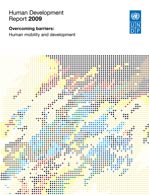
Migration, both within and beyond borders, has become an increasingly prominent theme in domestic and international debates, and is the topic of the 2009 Human Development Report (HDR09). The starting point is that the global distribution of capabilities is extraordinarily unequal, and that this is a major driver for movement of people. Migration can expand their choices —in terms of incomes, accessing services and participation, for example— but the opportunities open to people vary from those who are best endowed to those with limited skills and assets. These underlying inequalities, which can be compounded by policy distortions, is a theme of the report.
The report investigates migration in the context of demographic changes and trends in both growth and inequality. It also presents more detailed and nuanced individual, family and village experiences, and explores less visible movements typically pursued by disadvantaged groups such as short term and seasonal migration. There is a range of evidence about the positive impacts of migration on human development, through such avenues as increased household incomes and improved access to education and health services. There is further evidence that migration can empower traditionally disadvantaged groups, in particular women. At the same time, risks to human development are also present where migration is a reaction to threats and denial of choice, and where regular opportunities for movement are constrained.
National and local policies play a critical role in enabling better human development outcomes for both those who choose to move in order to improve their circumstances, and those forced to relocate due to conflict, environmental degradation, or other reasons. Host country restrictions can raise both the costs and the risks of migration. Similarly, negative outcomes can arise at the country levels where basic civic rights, like voting, schooling and health care are denied to those who have moved across provincial lines to work and live. HDR09 shows how a human development approach can be a means to redress some of the underlying issues that erode the potential benefits of mobility and/or force migration.
(Source: United Nations Development Programme report on Human Mobility (Migration). To get the full report, you may download it at http://hdr.undp.org/en/reports/global/hdr2009/)






